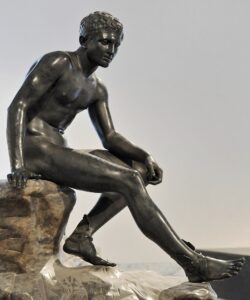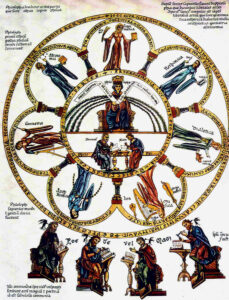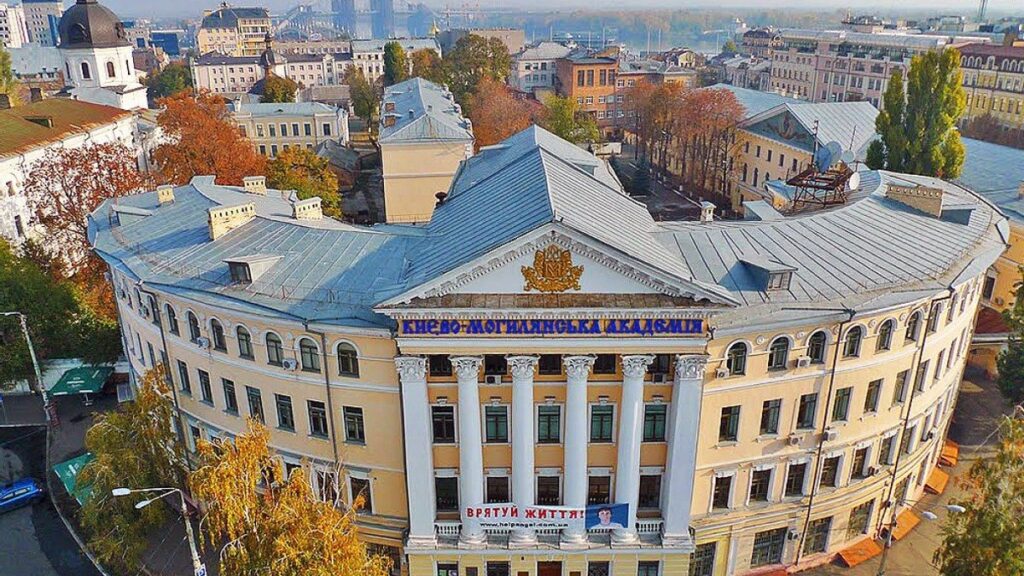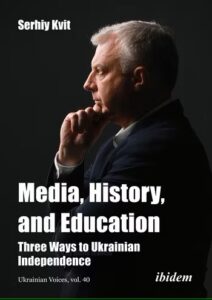 Звіт президента Національного університету “Києво-Могилянська академія” Сергія Квіта презентує розвиток навчального закладу в 2024 році. Третій рік повномасштабної війни став черговим випробуванням на стійкість як для українського суспільства та системи вищої освіти, так і для Національного університету “Києво-Могилянська академія”. Тому увага до питань національної безпеки та оборони залишалася пріоритетною на рівні з освітньою, дослідницькою, експертною та волонтерською діяльністю. Не менш важливим для НаУКМА є втримання суспільної уваги на продовженні освітніх реформ, особливо в контексті втілення концепції всебічної університетської автономії та, зокрема, запровадженні фінансової автономії ЗВО в Україні. Для Києво-Могилянської академії це також був виклик на здатність належно забезпечувати якість виконання всіх передбачених завдань, знаходити нові лідерські перспективи як в Україні, так і на міжнародній арені. Продовження →
Звіт президента Національного університету “Києво-Могилянська академія” Сергія Квіта презентує розвиток навчального закладу в 2024 році. Третій рік повномасштабної війни став черговим випробуванням на стійкість як для українського суспільства та системи вищої освіти, так і для Національного університету “Києво-Могилянська академія”. Тому увага до питань національної безпеки та оборони залишалася пріоритетною на рівні з освітньою, дослідницькою, експертною та волонтерською діяльністю. Не менш важливим для НаУКМА є втримання суспільної уваги на продовженні освітніх реформ, особливо в контексті втілення концепції всебічної університетської автономії та, зокрема, запровадженні фінансової автономії ЗВО в Україні. Для Києво-Могилянської академії це також був виклик на здатність належно забезпечувати якість виконання всіх передбачених завдань, знаходити нові лідерські перспективи як в Україні, так і на міжнародній арені. Продовження →


 Судження про гібридне сповзання людства у Третю світову війну найкраще характеризує завершення першої чверті ХХІ ст. Ліквідація світової системи безпеки, створеної після Другої світової війни, безпорадність глобальних інституцій, втрата здатності слухати і чути один одного, гібридність дружби і ворожнечі, глузування з освіченості на тлі наступу популізму і магічного мислення, зрештою ерозія таких фундаментальних цінностей, як правда і справедливість. Ні в чому не можна бути впевненим до кінця.
Судження про гібридне сповзання людства у Третю світову війну найкраще характеризує завершення першої чверті ХХІ ст. Ліквідація світової системи безпеки, створеної після Другої світової війни, безпорадність глобальних інституцій, втрата здатності слухати і чути один одного, гібридність дружби і ворожнечі, глузування з освіченості на тлі наступу популізму і магічного мислення, зрештою ерозія таких фундаментальних цінностей, як правда і справедливість. Ні в чому не можна бути впевненим до кінця.  Монографія Петра Іванишина “Націософська герменевтика: нариси” (Тернопіль, “Крила”, 2024) являє собою амбітну спробу поєднати два дискурси: філософської герменевтики та український національний дискурс. Проблема полягає в тому, що філософія стосується здатності людини глибоко мислити, а національний імператив спрямований на універсалізм іншого роду, пов’язаний в українській перспективі з національним визволенням і цілісністю власної інтелектуальної традиції. Важливою частиною авторської риторики є боротьба проти російського, як проти будь-якого іншого, імперського наративу.
Монографія Петра Іванишина “Націософська герменевтика: нариси” (Тернопіль, “Крила”, 2024) являє собою амбітну спробу поєднати два дискурси: філософської герменевтики та український національний дискурс. Проблема полягає в тому, що філософія стосується здатності людини глибоко мислити, а національний імператив спрямований на універсалізм іншого роду, пов’язаний в українській перспективі з національним визволенням і цілісністю власної інтелектуальної традиції. Важливою частиною авторської риторики є боротьба проти російського, як проти будь-якого іншого, імперського наративу.  Поява у видавництві “Дух і літера” книги В’ячеслава Брюховецького “Віктор Петров у двобої з Левіафаном: Біоґрафічні розвідки й літературознавчі констатації” – важлива подія українського літературного життя, яка, втім, навряд чи набуде значного публічного звучання в теперішньому контексті повномасштабної війни і соціальних мереж. Читання подібних книжок вимагають не лише можливості у вільну хвилину переключатися у щільному інформаційному потоці з однієї теми на іншу, здатності читати уважно, але також відповідного історичного та іншого гуманітарного знання.
Поява у видавництві “Дух і літера” книги В’ячеслава Брюховецького “Віктор Петров у двобої з Левіафаном: Біоґрафічні розвідки й літературознавчі констатації” – важлива подія українського літературного життя, яка, втім, навряд чи набуде значного публічного звучання в теперішньому контексті повномасштабної війни і соціальних мереж. Читання подібних книжок вимагають не лише можливості у вільну хвилину переключатися у щільному інформаційному потоці з однієї теми на іншу, здатності читати уважно, але також відповідного історичного та іншого гуманітарного знання.  Звіт президента Національного університету “Києво-Могилянська академія” Сергія Квіта презентує розвиток навчального закладу в 2024 році. Третій рік повномасштабної війни став черговим випробуванням на стійкість як для українського суспільства та системи вищої освіти, так і для Національного університету “Києво-Могилянська академія”. Тому увага до питань національної безпеки та оборони залишалася пріоритетною на рівні з освітньою, дослідницькою, експертною та волонтерською діяльністю. Не менш важливим для НаУКМА є втримання суспільної уваги на продовженні освітніх реформ, особливо в контексті втілення концепції всебічної університетської автономії та, зокрема, запровадженні фінансової автономії ЗВО в Україні. Для Києво-Могилянської академії це також був виклик на здатність належно забезпечувати якість виконання всіх передбачених завдань, знаходити нові лідерські перспективи як в Україні, так і на міжнародній арені.
Звіт президента Національного університету “Києво-Могилянська академія” Сергія Квіта презентує розвиток навчального закладу в 2024 році. Третій рік повномасштабної війни став черговим випробуванням на стійкість як для українського суспільства та системи вищої освіти, так і для Національного університету “Києво-Могилянська академія”. Тому увага до питань національної безпеки та оборони залишалася пріоритетною на рівні з освітньою, дослідницькою, експертною та волонтерською діяльністю. Не менш важливим для НаУКМА є втримання суспільної уваги на продовженні освітніх реформ, особливо в контексті втілення концепції всебічної університетської автономії та, зокрема, запровадженні фінансової автономії ЗВО в Україні. Для Києво-Могилянської академії це також був виклик на здатність належно забезпечувати якість виконання всіх передбачених завдань, знаходити нові лідерські перспективи як в Україні, так і на міжнародній арені. 
 https://chelps.eduhk.hk/post/university-autonomy-as-a-value-basis-and-necessary-environment-for-academic-integrity-in-the-context
https://chelps.eduhk.hk/post/university-autonomy-as-a-value-basis-and-necessary-environment-for-academic-integrity-in-the-context Презентація для учасників круглого столу «Переосмислення педагогічних університетів у контексті моделі Liberal Arts». Національний університет “Києво-Могилянська академія”, 20 червня 2024 року.
Презентація для учасників круглого столу «Переосмислення педагогічних університетів у контексті моделі Liberal Arts». Національний університет “Києво-Могилянська академія”, 20 червня 2024 року. Національний університет «Києво-Могилянська академія» продовжив свою роботу в умовах нових викликів і загроз другого року повномасштабної війни українського народу за свою незалежність. Зокрема були засновані нові важливі проєкти, які в подальшому багато в чому визначатимуть пріоритети розвитку нашого університету. Так, у 2023 році відкрилися два нових факультети. Це Факультет охорони здоров’я, соціальної роботи і психології (ФОЗ), а також Києво-Могилянська школа професійної та неперервної освіти (kma•pro). Нам вдалося зміцнити кадровий склад, стабілізувати фінанси, продовжити роботу над цифровізацією всіх управлінських процесів.
Національний університет «Києво-Могилянська академія» продовжив свою роботу в умовах нових викликів і загроз другого року повномасштабної війни українського народу за свою незалежність. Зокрема були засновані нові важливі проєкти, які в подальшому багато в чому визначатимуть пріоритети розвитку нашого університету. Так, у 2023 році відкрилися два нових факультети. Це Факультет охорони здоров’я, соціальної роботи і психології (ФОЗ), а також Києво-Могилянська школа професійної та неперервної освіти (kma•pro). Нам вдалося зміцнити кадровий склад, стабілізувати фінанси, продовжити роботу над цифровізацією всіх управлінських процесів.  Serhiy Kvit. Preface by Diane Francis
Serhiy Kvit. Preface by Diane Francis